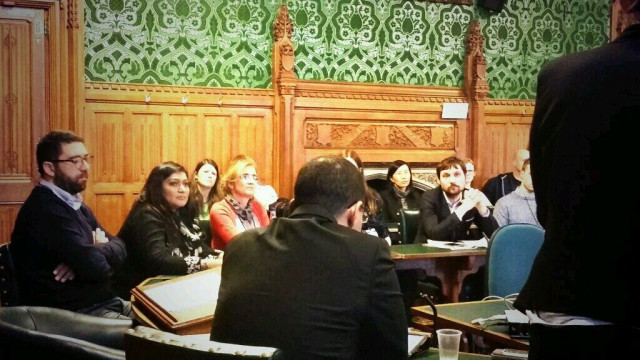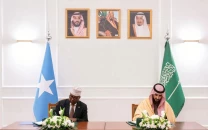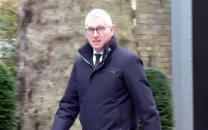Surveillance by UK, US sets bad precedent for privacy, freedom efforts in Pakistan: activist
Digital Rights Foundation Director raises questions about UK’s sale of surveillance tools to other governments.

PHOTO: TWITTER - @HERAHUSSAIN
She was addressing British MP Tom Watson and members of the Don't Spy On Us coalition, a group that defends privacy, free expression and digital rights in the UK and Europe. The session was held for UK members of parliament to hear first hand testimonies from experts and human rights defenders from outside the UK about privacy and Internet freedom.
“If America can do it, if the UK can do it, why expect human rights from Pakistan? This is what we hear more often now,” she said, addressing the lack of internet freedom and the increase in surveillance in Pakistan.
Dad, who is director of the Digital Rights Foundation in Pakistan said that when the UK and the US governments conduct surveillance of their citizens, “it gives our governments a chance to claim legitimacy for its own abusive behaviour”.
Raising questions about the UK’s own conduct, she said that the sale of military-grade surveillance tools by the UK to other governments was not an ethically neutral action, adding that the UK stands by while its “closest Nato ally treats civilians as fair game for cross-border drone strikes.”
“And to someone from Pakistan, these are not theoretical problems: in one province of Pakistan alone, 380 drone strikes have killed some 3,500 people, 200 of them children,” she added.
The Digital Rights Foundation is a research based advocacy NGO focusing on information and communications technology to support human rights, democratic processes and digital governance.
Other speakers who were part of the session included Vivian Newman Pont from Colombia, Claudio Ruiz from Chile and Hisham Almiraat from Morocco.
@nighatdad appeals to #UK govt to set a better example and not engage in surveillance that inspires countries like #Pakistan to do the same
— Huma Yusuf (@humayusuf) April 9, 2014
Cybercrime law in Pakistan is based off telegraph law from 19th century. @nighatdad #dontspyonus
— Privacy International (@privacyint) April 9, 2014



















COMMENTS
Comments are moderated and generally will be posted if they are on-topic and not abusive.
For more information, please see our Comments FAQ